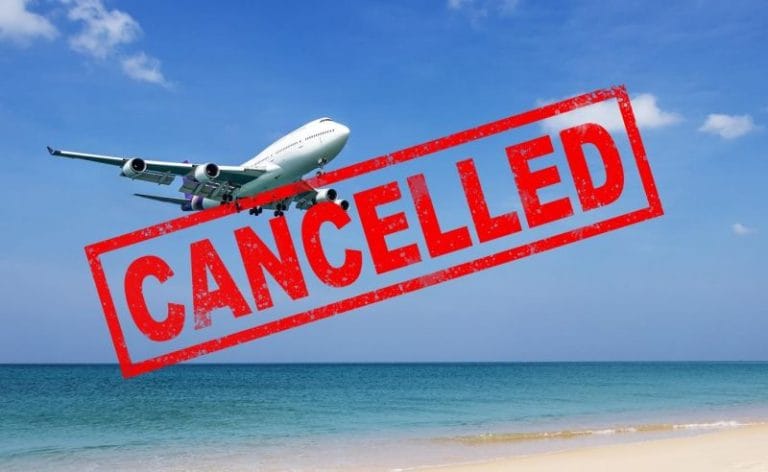Everything You Need to Know About Flight Cancellations
Flight cancellations can be one of the most frustrating aspects of travel, disrupting carefully laid plans and often leading to stress and confusion. However, understanding the reasons behind cancellations and knowing your rights as a passenger can help you navigate these situations more smoothly. In this blog, we’ll cover the key aspects of flight cancellations, what you can do when your flight is canceled, and tips on how to handle the situation effectively.

1. Common Reasons for Flight Cancellations
There are several reasons why airlines might cancel a flight, some of which are within the airline’s control, while others are not. Understanding the cause can help manage your expectations and responses.
Weather Conditions: One of the most common reasons for cancellations, especially in extreme weather such as snowstorms, hurricanes, or fog. Airlines will cancel flights if conditions make flying unsafe.
Technical Issues: Sometimes, aircraft face maintenance or technical problems that need to be resolved before takeoff. Safety is the top priority, so airlines may cancel flights rather than risk operating a compromised plane.
Operational Challenges: Overbooking, crew scheduling issues, or logistical problems such as delays in connecting flights can lead to cancellations.
Air Traffic Control Restrictions: Air traffic control may impose flight restrictions due to congestion or weather-related delays, leading airlines to cancel flights.
Strikes or Labor Issues: Strikes by airline staff, ground workers, or air traffic controllers can force airlines to cancel flights.
Governmental or Regulatory Issues: Sometimes, flights are canceled due to governmental decisions, such as airspace closures, security concerns, or pandemics, as seen during COVID-19.
2. What Are Your Rights When Your Flight is Canceled?
Depending on the country you are flying to or from, and the airline’s policy, your rights as a passenger may vary when a flight is canceled. Here’s a general breakdown of what you can expect:
Rebooking or Refund: Most airlines will offer passengers a choice between rebooking on another flight (either the next available one or on a different airline) or a full refund. This applies to both domestic and international flights.
Compensation: In regions like the European Union (under EC 261 regulation), passengers may be entitled to financial compensation for flight cancellations, depending on the distance of the flight and the circumstances of the cancellation. Compensation may not apply if the cancellation was due to extraordinary circumstances, such as severe weather.
Accommodation & Meals: If your flight cancellation forces you to stay overnight, many airlines will provide hotel accommodations and meal vouchers. Be sure to check with the airline’s customer service about your entitlements.
3. What to Do If Your Flight Is Canceled
Having your flight canceled can be inconvenient, but taking the right steps can help mitigate the impact.
Step 1: Contact the Airline Immediately
If you find out that your flight has been canceled, try to contact the airline as soon as possible. You can use the airline’s website, mobile app, or call their customer service center. Many airlines allow you to rebook online or through their app, which can be quicker than waiting in line at the airport.
Step 2: Know Your Alternatives
Before contacting the airline, check out the alternatives available, such as other flights to your destination or nearby airports. This knowledge can help you negotiate better options with the airline. In some cases, airlines may also rebook you on another carrier.
Step 3: Ask for Compensation
If you believe you are entitled to compensation (e.g., under EU rules), ask the airline about your eligibility. Make sure to keep any receipts for expenses incurred due to the cancellation (meals, accommodations, transportation) as they might be reimbursed later.
Step 4: Stay Updated
Flight cancellations often lead to delays and changes in schedules for subsequent flights. Use mobile apps, flight trackers, or SMS alerts to stay updated on your new flight details or any further disruptions.
Step 5: Be Patient and Polite
It’s important to stay calm and be polite when dealing with airline staff. Flight cancellations are stressful for both passengers and employees. By remaining courteous, you’re more likely to get assistance faster.
4. How to Avoid Cancellations
While cancellations are not always avoidable, there are steps you can take to minimize the chances of encountering one:
Choose Early Morning Flights: Flights scheduled earlier in the day are less likely to be canceled than those later in the day. Delays tend to accumulate throughout the day, increasing the chances of cancellations for evening flights.
Fly Nonstop When Possible: Direct flights are less likely to face complications like missed connections or delays caused by other airports.
Check the Weather Forecast: If a storm or bad weather is predicted at your departure or destination city, be prepared for potential cancellations.
Monitor Your Flight: Use flight tracking apps or the airline’s notifications to monitor your flight status. The sooner you know about a possible disruption, the better you can prepare.
5. Dealing with the Financial Impact of Cancellations
Travel Insurance: Purchasing travel insurance that includes coverage for flight cancellations is one of the best ways to protect yourself financially. Some policies will cover costs for accommodations, meals, and alternative transportation if your flight is canceled.
Credit Card Protections: Some credit cards offer trip interruption and cancellation insurance as part of their benefits. Check with your credit card provider to see if you’re covered when booking your flight with their card.
6. The Future of Flight Cancellations: Airlines and Flexibility
In the post-pandemic world, many airlines have become more flexible with their cancellation and rebooking policies. Travelers now often have the option to change or cancel flights with little to no penalty, giving passengers peace of mind when booking tickets. Be sure to check your airline’s policies before booking, as they may offer greater flexibility than before.
Final Thoughts
Flight cancellations can be disruptive, but being informed and prepared can make a big difference in how you handle the situation. Know your rights, act quickly, and have a backup plan in place to minimize the stress of a canceled flight. Whether it’s staying informed through apps or ensuring you have insurance, a little foresight goes a long way when navigating the unpredictable world of air travel.
If you’ve recently experienced a cancellation or are worried about future flights, check your airline’s policies on cancellations and rebooking to ensure a smoother journey ahead.
